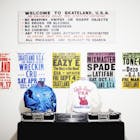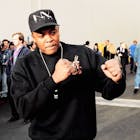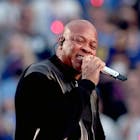
The Impact of the L.A. Riots
'The Chronic' at 30: The Impact of the L.A. Riots
Published Thu, December 1, 2022 at 11:31 PM EST
Dr. Dre’s landmark album, The Chronic, is well known for a number of things — definitively introducing G-funk into the Hip-Hop lexicon, establishing Snoop Dogg as a future superstar, cementing and defining Dre’s production legacy, and steering what was classified as mainstream Hip-Hop in a new direction.
But you can’t adequately talk about the impact of The Chronic without acknowledging the huge role the 1992 L.A. riots played in its creation.
A pivotal moment in modern American history, the 1992 riots were sparked both by the acquittal of the four officers who brutally beat Rodney King and the death of 15-year-old Latasha Harlins, who was shot and killed by a Korean store clerk after he accused her of her stealing. The store clerk was sentenced to community service.
Those consequential moments were compounded by what'd been happening in the streets of L.A. for years prior — namely the sweeping effects of the crack epidemic and President Ronald Regan’s subsequent so-called war on drugs, which saw heavy, violent police presence in mostly Black communities, and war-time tactics used against citizens, including battering rams blasting through neighborhood homes during raids.
Dr. Dre famously addressed the seething fury that permeated Black communities as a result of the escalating police presence during his time with Compton-bred mega group N.W.A. on songs like “Fuck The Police,” a vivid, emotional assault of state-sanctioned police violence. In Jonathan Abrams' new book, The Come Up an Oral History of the Rise of Hip Hop book, Ice Cube says that at first Dre, who at the time was entangled in the system, serving time on the weekends, didn't want to do the track and draw attention to himself.
"Dre said that he didn't wanna do the song," the song's writer, Ice Cube, recalled. "I had rapped it to him a year before we actually did it, and he was going through an issue where he had to go to jail every weekend, Friday night, get out Monday morning. He didn't wanna do the record cause he was like 'Dude I don't want these sheriffs fuckin me up when they find out that I produced this record when I go in for the weekend.' He had just served like three months or something so he was like 'Nah.'"
Eventually, Dre came around after some convincing from Eazy-E, and once his sentence was over. "By then Dre was off of that weekend program, and he was like 'Fuck it, let's do it. Let's start working on it.'"
It’s not surprising then, that while he was crafting his solo debut, Dre and his primary collaborators were compelled to put what they were witnessing firsthand in their neighborhoods on wax. Dre was specifically inspired by first-time filmmaker Matthew McDaniels’ documentary, Birth of a Nation 4-29-92. At the time, McDaniels was an intern at L.A.’s KDAY radio station, and he captured raw footage of people’s immediate response following the King verdict — their disbelief, distress, and rage. The Chronic’s “Little Ghetto Boy” and “The Day the Niggaz Took Over” both feature audio from the documentary.
On “The Day Niggaz Took Over,” which is a direct recounting of the L.A. riots, the track opens with a furious clip from a protestor featured in the film: "I'ma say this and I'ma end mine. If you ain't down for the Africans here in the United States Period, point blank. If you ain't down for the ones that suffered in South Africa from Apartheid and shit, damnit, you need to step your punk ass to the side and let us brothers and us Africans step in, and start puttin' some foot in that ass.”
The opening verse follows with producer/rapper Daz Dillinger offering both explanation and warning: “Dem riot in L.A. 'cause dem no really wanna see/Niggas start to loot and police start to shoot.”
On the Donny Hathaway sampling “Little Ghetto Boy,” the mood is darker and more somber and again opens with a clip from a protestor: “So, all of you Africans, all of you Africans that wanna do things that's working for other people, y'all need to open your own business, save your money…”
DROP YOUR EMAIL
TO STAY IN THE KNOW
The Parliament Funkadelic sound in which Dre wrapped The Chronic not only made it more palatable for mainstream listeners but smoothed over the low-burning rage that's spread in pockets throughout the album. Even the party-gangster tracks are in many ways informed by the disenfranchisement of young Black men and the violence they were subjected to by law enforcement— the posturing, the sense of invincibility, and the desire to live it up despite the turmoil surrounding them — all of it felt largely reactionary.
"It's a document," McDaniels told NPR of The Chronic in 2013. "It's an audio document, with a lot of creativity and art and entertainment going along with it. Some people might think that that's wrong, but it's art, it's poetry. And it's supposed to have pain in it. You can gather that from listening to The Chronic — about the L.A. riots — you can feel it, you can kind of understand. And a lot of people agree that they captured it incredibly well."
The Chronic was indelibly shaped by the L.A. riots and remains one of the most important documenters of the time today.






